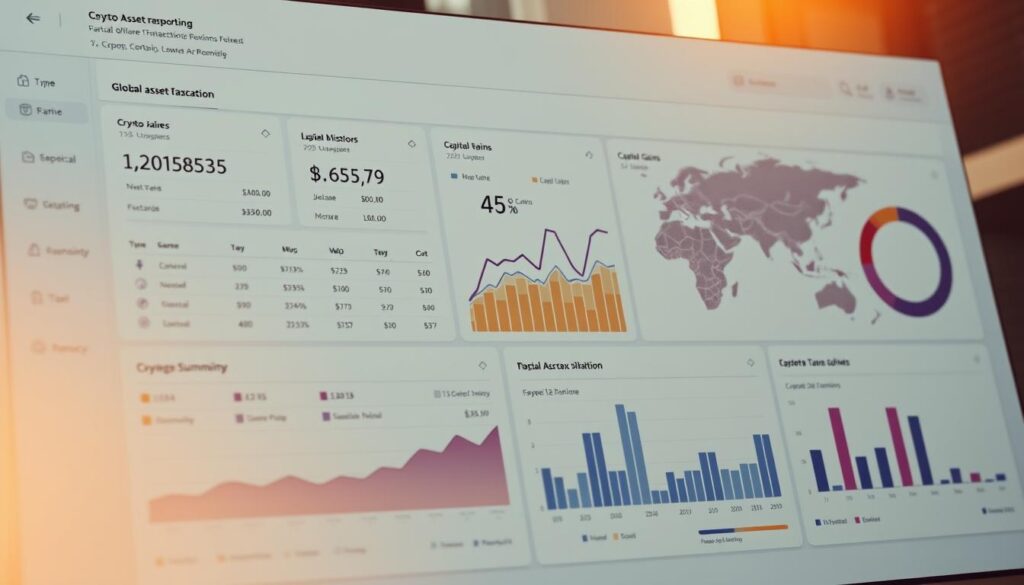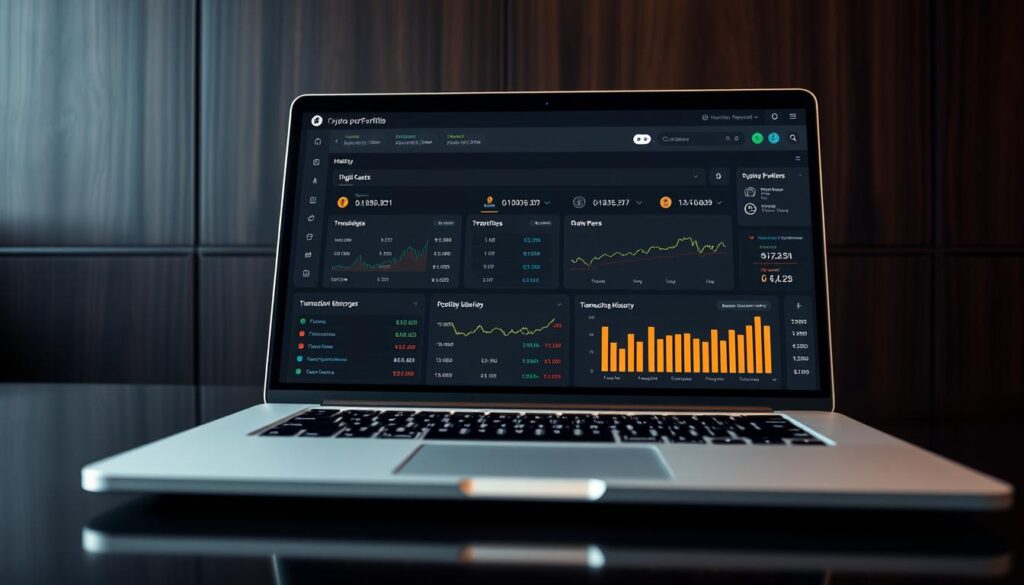Crypto tax reporting for international investors needs to be precise. The IRS sees digital assets like cryptocurrencies and NFTs as taxable. This means you must track your transactions carefully.
Investors have to report any gains or losses on tax forms. They must follow the rules in the IRS digital assets guide. It’s also important to know the tax laws in different places to avoid penalties.
Key Takeaways
- Reporting crypto transactions is mandatory under U.S. tax law, even for non-residents.
- Failure to disclose digital asset holdings risks audits and fines across borders.
- IRS guidelines mandate tracking cost basis, sale dates, and cross-currency exchanges.
- International tax compliance requires understanding local and U.S. reporting thresholds.
- Tools and professionals specializing in crypto help simplify global tax filing.
Understanding the Complexities of Global Cryptocurrency Taxation
Getting a handle on cryptocurrency taxation means knowing how countries see digital assets. Tax laws differ a lot, making it tough for investors from abroad. Each country’s rules affect what you need to report and the risks you face.
How Digital Assets Are Classified in Different Jurisdictions
How assets are seen affects taxes. For example:
- Germany sees crypto as personal assets, so you don’t pay taxes on personal use.
- In Japan, crypto is property, so you pay taxes when you sell it.
- The U.S. IRS views crypto as property too, meaning you have to report capital gains.
The Challenge of Multiple Tax Residencies
Investors with connections to several countries face complex tax regulations for overseas investors. Tax rules can clash. For example, living in Spain but being a U.S. citizen might mean you have to file in both places. Missing these filings can lead to big penalties.
Impact of Citizenship vs. Residency on Tax Obligations
U.S. citizens everywhere must report all income, even if they live abroad. This is different from most countries, which only tax local income. This double reporting can make it hard for Americans living abroad to follow the rules.
Why International Investors Face Unique Crypto Tax Challenges
Crypto’s global appeal meets the limits of tax systems made for local areas. Foreign investor tax obligations differ greatly, leading to a maze of rules. For instance, a German investor using a Singapore exchange must report under EU and Singapore laws. The mix-up starts with currency conversion: gains in euros might not match when taxed in US dollars.
- Currency Chaos: Swinging exchange rates make profit/loss figures hard to figure out across different currencies.
- Data Fragmentation: Exchanges in various countries offer uneven transaction records, making it tough to gather data for tax returns.
- Legal Collisions: Some places see crypto as property, others as currency, leading to reporting mismatches.
Blockchain’s global nature amplifies these problems. A Canadian living in Japan with US-mined crypto must deal with three countries’ laws. Not following cross-border crypto tax requirements can lead to fines. To comply, one must track global transactions in real-time. Yet, no single tool covers all 200+ crypto-friendly exchanges. Keeping up with changing rules worldwide is a constant challenge.
The Fundamentals of Crypto Tax Reporting for International Investors
Understanding crypto tax reporting for international investors is key. It involves knowing global rules and local differences. Whether you hold assets abroad or trade worldwide, you must track taxable events and income types. Also, currency changes are important. Here’s how to follow global standards:
Taxable Events in Cryptocurrency Trading
- Selling crypto for fiat (e.g., Bitcoin to USD)
- Swapping crypto (e.g., Ethereum for Litecoin)
- Mining, staking, or liquidity pool rewards
- Gifting or receiving crypto as payment
Capital Gains vs. Ordinary Income
In many places, selling crypto is seen as capital gains, taxed less for long-term. Income from mining is taxed more. Check your country’s rules on when to start counting the 12-month period.
Exchange Rate Considerations
Every transaction must convert crypto values into local fiat at the exact date of the event. For offshore crypto tax reporting, use official sources for exchange rates. Wrong rates can lead to audits.
Documentation Requirements
Keep records of: wallet addresses, trade dates, purchase/sale prices, fees, and cost basis calculations. Cross-border investors must follow each tax authority’s rules. Without proof of transactions, you risk penalties.
US Tax Obligations for Foreign Crypto Investors
Non-resident crypto tax rules are important for global investors using US platforms. The IRS requires global tax reporting for digital assets held in US exchanges or wallets. Not reporting crypto can result in penalties under FBAR and Form 8938.

FBAR Requirements and Cryptocurrency Holdings
Crypto on US exchanges or wallets might be seen as a “financial account” by FBAR. You must report if the total value is over $10,000 at any point in the tax year. Important factors include:
- Accounts with US-based crypto platforms
- Transactions processed through US intermediaries
- Joint ownership with US persons
Form 8938 and Substantial Presence Test
Foreign investors need to file Form 8938 if their crypto assets exceed IRS thresholds. The substantial presence test helps figure out if you’re a resident. Meeting 31-day and 183-day rules in three years can change your tax status. Not reporting can lead to a 50% penalty.
IRS Virtual Currency Guidance for Non-Residents
Non-residents using US exchanges must follow IRS guidance for capital gains. Withholding applies to payments from US sources, and tax treaties can lower your liability. You need to keep records of transaction dates, values, and where they happened.
Tax Treaties and Their Impact on Cryptocurrency Reporting
Tax treaties between countries are key for international tax compliance in crypto investing. They help avoid double taxation by defining who gets to tax what income. For instance, they set rules for capital gains, interest, and staking rewards.
Investors can get tax credits from foreign taxes to lower their bills. Let’s say a US citizen has crypto in Germany. A treaty might let them use German taxes on their US returns, avoiding double taxation. But, most treaties were made before digital assets existed, leaving gaps in tax regulations for overseas investors.
- Foreign tax credits reduce duplicate payments on crypto profits
- Treaties often prioritize residency over citizenship for income sourcing
- Staking and DeFi rewards lack clear treaty definitions in most agreements
Now, countries like the US and EU are updating treaties to cover crypto. Investors need to check treaty terms every year since they can change. Getting help from experts is crucial to understand unclear parts and use treaty benefits right. Regularly reviewing these agreements helps stay compliant and save on taxes in this changing world.
Navigating Cross-Border Transactions and Their Tax Implications
Managing cross-border crypto tax needs careful planning. International investors must match their trading with global tax rules to dodge penalties. First, learn how different places track transactions on platforms like Binance, Coinbase, or Kraken.
Dealing with many exchanges means being open. Choose platforms that give detailed reports for tax software. Keep track of every trade, including:
- Withdrawals across borders
- Fee structures affecting taxable gains
- Exchange-based reporting tools
Timing is key to lower taxes. Plan your trades to fit tax year ends for better rates. For instance:
- Hold assets longer for long-term tax perks
- Align sales with residency status changes
- Use FIFO/LIFO methods wisely
Use entity structures like LLCs or trusts to avoid double tax. Use tax treaties to get credits for foreign payments. Look into rules like Singapore or Malta’s for tax benefits. Real strategies include:
- Storing crypto in tax-advantaged accounts
- Reporting income in places with lower rates
- Timing asset transfers to match treaty rules
Proactive planning helps follow rules and keeps more of your money. Always check local laws before moving assets across borders.
Common Reporting Standards (CRS) and Cryptocurrency Compliance
Global tax reporting for digital assets has changed with the Common Reporting Standard (CRS). Now, it requires openness about crypto holdings. Financial institutions worldwide must follow international tax rules to meet cross-border regulations.
How Financial Institutions Report Crypto Holdings
Financial institutions in CRS countries must report crypto wallet details and values to tax agencies. Banks and crypto exchanges treat crypto wallets like regular accounts. They submit annual data to tax authorities.
- Traditional banks flag crypto transactions tied to customer accounts.
- Exchanges must report wallet addresses balances exceeding €50,000 in some jurisdictions.
Information Exchange Between Tax Authorities
Over 100 countries share crypto data automatically under CRS. This targets undeclared holdings. Recent updates include NFTs and staked coins as reportable assets.
In 2023, 30% more jurisdictions require crypto-specific disclosures. This shows a growing trend in crypto reporting.
Privacy Considerations for International Investors
Investors struggle with privacy and compliance. Crypto’s anonymity drew early users. But, the OECD’s Crypto-Asset Reporting Framework (CARF) now demands detailed reports from custody providers.
Privacy coins like Monero are still debated in reporting systems. Not disclosing crypto assets under CRS rules can lead to penalties up to 25% of asset value in OECD member states. CARF aims to standardize reporting by 2025, requiring real-time tracking for international portfolios.
Record-Keeping Best Practices for Global Crypto Portfolios
For international investors, keeping accurate crypto tax records is key. You need to document every transaction, from buying and selling to earning rewards. Here are some tips to help you stay ready for audits:

- Log all transactions with timestamps in UTC format and local time zones
- Track fiat values using exchange rates valid at transaction times
- Maintain cost basis calculations for each crypto asset movement
- Document airdrops, hard forks, and chain splits with date and wallet addresses
Make sure to document income from mining, staking, and DeFi activities. Use platforms that can export data in a way the IRS likes. For offshore tax reporting, keep records for at least six years. This covers longer compliance periods in other countries.
Store backups in encrypted formats that follow GDPR and other data laws.
Critical details never to omit:
– Smart contract addresses for NFT transactions
– Original purchase dates for inherited crypto assets
– Jurisdiction-specific tax ID numbers on all platform accounts
Use tools like CoinTracker or Koinly to check your records regularly. This helps avoid issues with DeFi earnings and portfolio changes. Always have physical or cloud backups in different places. This makes sure you can access them during audits.
Tools and Software for International Crypto Tax Calculation
For international investors, managing crypto taxes is crucial. Specialized tools help meet foreign tax obligations. These platforms track transactions, calculate taxes, and create reports for local laws.
Features to Look for in Cross-Border Tax Solutions
Good tools handle taxes in many places, support all big cryptocurrencies, and track costs. They should connect with exchanges worldwide and update currency values in real time. It’s also key to follow OECD standards and have reports ready for audits.
Popular Tax Reporting Platforms for International Users
- CoinTracking: Supports 200+ countries and 150+ exchanges, with customizable tax forms and multi-currency calculations.
- Koinly: Highlights automatic price conversion and jurisdiction-specific templates, aiding compliance with EU and US rules.
- Taxbit: Focuses on NFT and staking rewards reporting, with IRS and FATCA compliance features.
Cost-Benefit Analysis of Tax Software vs. Professional Services
For small portfolios, software like Koinly is affordable, costing $39–$99 a year. But, for complex cases or high transaction volumes, hiring a CPA is better. A mix of software and professional help can save money without sacrificing accuracy.
Working with Tax Professionals Specialized in Cryptocurrency
Handling cryptocurrency taxation across borders needs special skills. Look for experts in non-resident crypto tax rules and cross-border cases. They should have certifications like CPA or EA and crypto training.
Ask if they’ve worked with Form 8938 or CRS reporting. This shows they know the ropes.
- Certifications: Check for enrolled agents or CPAs with crypto-specific certifications
- Experience: Prior clients in multi-country tax scenarios
- Tools: Use of software like CoinTracker or ZenLedger for accurate reporting
- Language: Bilingual advisors for non-English jurisdictions
Be wary of advisors who ignore DeFi or don’t know about FATCA for non-residents. Ask for examples of their work. Fees can be $500-$3,000+ based on the case’s complexity.
Make sure they can show results like avoiding penalties or getting refunds.
Use secure platforms for team work across borders. It’s important that all advisors agree on tax rules. Regular meetings are key during changes like the EU’s DAC 8 proposals.
Case Studies: Successful Tax Reporting Strategies for Different Scenarios
Understanding cross-border crypto tax rules often needs custom solutions. These examples show how investors meet tax rules for overseas investors while staying legal.
The Digital Nomad Crypto Trader
A traveler based in Bali used CoinTracking to track transactions. They worked with a CPA who knew cross-border crypto tax requirements. They followed these steps:
- Automating transaction logs via exchanges
- Mapping residency rules in 3+ countries
- Annual filings in their home jurisdiction
Long-Term Holder with Multiple Residencies
A Swiss investor with U.S. ties kept detailed spreadsheets since 2017. Their plan included:
- Yearly audits with a dual-qualified tax advisor
- Separate wallets for jurisdiction-specific assets
- Form 8938 filings for over $100K holdings
DeFi Participant with Global Interests
A yield farmer in Singapore used Koinly to document activity. They reported governance token rewards as taxable income in many places. Their strategies were:
- Tracking staking rewards via blockchain explorers
- Consulting with DeFi-specialized tax attorneys
- Using Form 8938 for offshore holdings
These cases show the importance of planning ahead. Each investor used special software, advice for their area, and detailed records to follow tax regulations for overseas investors. Keeping records up to date and getting professional help is key in all cases.
Risk Assessment: Penalties for Non-Compliance Across Jurisdictions
Foreign investors with cryptocurrency must follow tax rules to avoid big problems. Not following foreign investor tax obligations or non-resident crypto tax rules can cause fines, audits, or legal trouble. It’s key for global crypto holders to know about these risks.

Common Audit Triggers for International Crypto Investors
Auditors look for certain behaviors:
- Large crypto trades not reported in tax filings
- Unexplained income jumps linked to crypto gains
- Not reporting crypto exchanges overseas
- Bank records not matching crypto activity
Voluntary Disclosure Programs for Previous Non-Compliance
Some places offer ways to fix past mistakes:
- US: IRS’s Offshore Voluntary Disclosure Program charges fees but spares criminal charges
- UK: HMRC’s New Disclosure Facility lowers penalties for early reporting
- Canada: Voluntary Disclosures Program drops prosecution for timely reports
Statute of Limitations Considerations
Deadlines differ by place:
- US: 3 years standard audit window; 6 years for big understatements
- EU: Germany allows audits up to 4 years; France goes up to 5 years for big mistakes
- Singapore: 4 years for most, but fraud audits never end
Emerging Regulatory Trends Affecting International Crypto Taxation
Global tax reporting for digital assets is changing fast. Governments are working to handle cryptocurrency taxes better. The OECD’s Crypto-Asset Reporting Framework wants to set the same rules for exchanges. This means users will have to share their transaction data with tax authorities.
This change affects how investors in the U.S. and other countries track their assets. It’s important for them to keep up with these new rules.
- Automatic exchange of information between nations is becoming standard, reducing anonymity for crypto traders.
- Blockchain analytics tools now help tax agencies trace cross-border transactions, increasing scrutiny on decentralized finance (DeFi) activities.
- Nations like the U.S. and EU are aligning rules to classify DeFi rewards and NFTs as taxable events, creating stricter compliance demands.
Investors need to keep their records up to date to meet these new requirements. The OECD’s guidelines might require real-time reporting for big transactions. But, there’s still a debate about privacy.
It’s crucial to stay updated on these changes. This way, investors can follow cryptocurrency taxation rules as they grow globally.
DeFi, NFTs, and Staking: Special Reporting Considerations
Decentralized Finance (DeFi), non-fungible tokens (NFTs), and staking rewards make cryptocurrency taxation more complex. Tax authorities worldwide find it hard to classify these new things. Investors must figure out unclear rules, especially when reporting offshore.
Adapting strategies to avoid penalties is key, especially where rules are slow to catch up with market growth. Issues include figuring out the value of DeFi rewards, tracking NFT sales across borders, and knowing when to report staking income.
Tax Treatment of Liquidity Provision and Yield Farming
Liquidity providers and yield farmers face unique challenges. Calculating gains or losses from DeFi protocols is hard. Tax authorities might see earned tokens as taxable income right away, even if their value drops later.
Keeping detailed records of all transactions, including smart contract interactions, is crucial for audits.
NFT Transactions Across Borders
Cross-border NFT sales challenge current tax rules. Sellers must figure out where to report capital gains. This could be based on the buyer’s location, the blockchain’s jurisdiction, or the seller’s home country.
Royalties from NFT platforms might lead to withholding taxes in different places. This requires careful offshore crypto tax reporting. It’s important to document every transaction’s location.
Proof-of-Stake Rewards Taxation Globally
Staking rewards are taxed differently around the world. Some countries tax this income as soon as it’s received, while others wait until it’s sold. Investors need to understand these differences when filing taxes in various places.
It’s important to know the market value of rewards at the time they’re received to avoid disputes.
For unclear areas, it’s best to be cautious. Value tokens at the rate they’re received, keep detailed records of cross-border transactions, and deal with different tax rules carefully. Being proactive with record-keeping helps reduce audit risks in changing regulatory environments.
Planning Ahead: Creating a Sustainable International Crypto Tax Strategy
For international investors, crypto tax reporting is more than just reacting to past trades. It’s about planning ahead. Start by setting up your investments to follow tax rules in important places. Using legal entities like LLCs or trusts can help with tax compliance, lower audit risks, and make things more efficient.
- Evaluating residency options based on crypto-friendly tax policies
- Timing transactions to leverage foreign tax credits or deferral rules
- Using tools like dedicated crypto tax software to track cross-border gains and losses
Changing where you live can save you money. Moving to a place with no capital gains tax on crypto can reduce your tax bill. But, you must do it legally to avoid fines. Also, planning your estate is key: make sure your heirs know who gets what, avoiding fights.
Keeping up with global tax laws is essential. Watch for changes, like new rules on taxing proof-of-stake earnings. By making smart choices, being flexible, and keeping good records, you can grow your investments while staying tax compliant.
Moving Forward in the Evolving Landscape of Global Crypto Taxation
Keeping up with foreign investor tax obligations and global tax reporting for digital assets is key. Investors need to plan ahead, considering their own situation. They must balance tax rules with their investment activities.
Creating a plan for each investor is crucial. It should cover tax residency, transaction history, and asset types. This helps avoid fines.
Rules change fast, so it’s important to stay informed. Watch for updates from the IRS or OECD. Getting tax alerts or working with crypto tax experts is helpful.
Being proactive, like keeping records or using tax software, makes reporting easier. It also lowers the risk of trouble.
As rules get stricter, tax authorities will work closer together. They might share more data and use blockchain for reporting. Being ready for these changes is important.
Adding tax planning to investment decisions is smart. It keeps your finances safe. By tackling foreign investor tax obligations early, you can protect your digital assets. Staying compliant now helps you thrive in a stricter crypto world.
FAQ
What are the main tax obligations for international investors dealing with cryptocurrency?
International investors face different tax rules in various places. They must deal with capital gains taxes, income tax on crypto earnings, and reporting foreign bank accounts. Knowing these rules is key to avoid tax problems with crypto.
How do tax regulations for overseas investors differ from domestic investors?
Overseas investors face more complex tax rules because of different countries’ laws. Domestic investors mainly follow local tax laws. But, foreign investors must understand international tax rules, including tax treaties and double tax issues.
What constitutes a taxable event in cryptocurrency trading?
Trading crypto can lead to tax events. These include converting crypto to cash, trading one crypto for another, mining, or staking. Each event can have different tax rules based on where you live.
How can international investors manage their crypto tax reporting effectively?
Managing crypto tax reporting well means keeping detailed records of all trades. You should also know how exchange rates affect taxes. Using tax software for international crypto taxes is helpful. Getting advice from crypto tax experts is also a good idea.
Are there any penalties for non-compliance in cryptocurrency tax reporting?
Yes, not following crypto tax rules can lead to big penalties. These include fines and interest on unpaid taxes. Each country has its own rules for penalties. Knowing what can trigger audits can help avoid problems.
What role do tax treaties play in cryptocurrency taxation for international investors?
Tax treaties help avoid double taxation by deciding which country taxes certain income. Investors should know the limits of these treaties, especially for digital assets.
What are the best practices for record-keeping for global crypto portfolios?
Keeping good records is key. This means detailed logs of trades, accurate cost basis, and following local laws. Also, make sure to back up your financial data.
How do Common Reporting Standards (CRS) affect cryptocurrency investors?
CRS requires financial institutions to report account info to tax authorities. This means crypto investors should know how their accounts might be reported and the privacy issues that come with it.
What strategies can international investors employ to minimize tax burdens?
To lower taxes, investors can use tax-loss harvesting, set up legal entities in good tax places, and time trades for tax benefits. Good long-term planning is key for avoiding tax problems.
Can digital asset investments impact residency planning?
Yes, crypto investments can change where you live for tax purposes. Different countries tax crypto differently. Thinking about how tax residency changes might affect your taxes is important.
What should investors consider when partnering with tax professionals specialized in cryptocurrency?
Look for tax pros who know crypto and international tax well. They should have experience with cross-border reporting and understand digital asset laws.


No comments yet